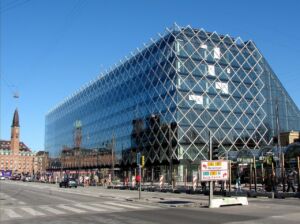News
Business Round-Up: Is a Dansk Byggeri-Dansk Industri merger on the cards?
This article is more than 5 years old.

The state of municipal buildings and paltry commitments to increasing the labour force reflect poorly on the government, contends Dansk Industri (photo: Orf3us)
Dansk Byggeri, the Danish construction association, voted in favour of a merger with Dansk Industri (DI), the confederation of Danish industry, during a cabinet meeting on Tuesday, reports DI Business.
A day later the same question was posed to DI members, and should they approve, a merger could become a reality on September 1.
Dansk Byggeri consists of approximately 5,700 member companies representing a total of about 100,000 employees in Denmark, while DI has around 11,800 members with 455,000 employees.
Largest and most competent
Dansk Byggeri chair Claus Bering insists that the merger is aimed to “create Denmark’s supremely largest and most competent business organisation”.
He adds that the new organisation will also be the largest one in Denmark for small and medium-sized businesses as 54 percent of the merged organisation’s membership crowd will be presented by companies with less than 10 employees.
“With the merger, Dansk Byggeri is much better equipped for the future cyclical fluctuations and collective bargaining by being part of a larger, broader and more influential organisation. That’s a definite advantage in the unpredictable world we are a part of,” he added.
Danish holiday home bookings double as borders open
The number of bookings of Danish holiday homes during the high season has increased by 100 percent, preliminary figures from Statistics Denmark revealed on Tuesday. DI Business quotes the Dansk Industri head of tourism, Sune K. Jensen, who commented: “It is truly good news for both the vacation rental industry and the whole coastal tourism.” However, he also admits that “the relatively late border opening has had an impact on the number of bookings from the German market”. Indeed, the number of cottage bookings made by Germans has only risen 28 percent.
New technological solution for 16,000 hospital patients
Biomodics has developed a special balloon that can help 16,000 hospital patients who catch an unpleasant urinary tract infection every year, reports DI Business. In collaboration with the LINX Association, the company has created a device that releases a drug precisely in that place that has to be treated – in this case, in the bladder. In the long run, the technology may also be further developed to treat other diseases such as bladder cancer.
100 million euro grant awarded to support Danish biotechnology research
Denmark’s largest foundation, the Novo Nordisk Foundation, has granted 100 million euros to the DTU Biosustain research centre. The money will be allocated over five years to ensure the continuation of the centre’s research activities in regard to the development of sustainable production solutions and green consumer products. The DTU Biosustain aims to develop bio-based alternatives to products that today are mainly produced through oil-based processes, such as medicine or speciality chemicals.
Prices have not increased over the past year
The overall consumer price index has not changed over the last year, new figures from Danmarks Statistik reveal. As there is no inflation, consumer prices have remained at the same level as May last year – the first time this has happened since 2016. TEKNIQ Arbejdsgiverne explains that such low inflation “indicates there is considerable uncertainty in the market, which can cause Danes to spend some extra money”.
Danish exports keep falling
Danish exports fell by 5.8 percent in May, according to Danmarks Statistik. Almost 850,000 Danish jobs have been affected by it.










































